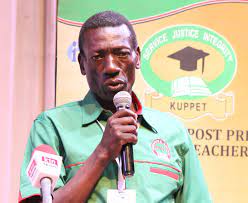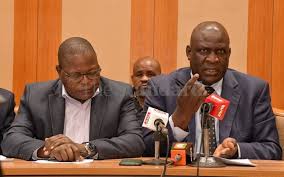
BIG BLOW AS KNUT BOYCOTTS TSC FORUMS
Knut Collins Oyuu stand. The Teachers Service Commission (TSC) Act of 2012’s proposed revisions have been rejected by the Kenya National Union of Teachers (Knut), who claim that the measures are punitive and unfavorable.
Knut Collins Oyuu stand
According to Knut, they were not involved in the Bill’s formulation by the TSC.
The union has promised to abstain from a TSC-organized public participation activity that was set to happen at the Kenya School of Government today. Sixty percent of the proposed bill, according to Knut Secretary-General Collins Oyuu, is detrimental to teachers.
“We have made the decision not to attend the TSC-organized stakeholders’ forum tomorrow [today] to discuss the TSC (Amendment) Bill 2024.”
“They can’t take advantage of us. We will no longer put up with being reprimanded,” Mr. Oyuu informed reporters at the unions office.
According to Mr. Oyuu, Knut was sent with a letter by TSC on Tuesday of last week, which was dated January 29 and contained the proposed revisions to the TSC Act.
He clarified that early childhood development and education (ECDE) would not be included in the draft Bill’s proposed reform of the basic education system, which would instead include primary, junior high, senior secondary, and teacher preparation programs.
“The proposed reforms define basic education as Pre-Primary One (PP1) through Grade Nine, which are subsequently referred to as comprehensive schools before senior secondary. We are aware that ECDE is where basic education begins,” he remarked.
The TSC’s plan to decide teacher compensation without consulting the unions and with the guidance of the Salaries and Remuneration Commission (SRC) is one noteworthy idea that Knut has presented.
Mr. Oyuu claimed that this was against Article 230 of the Constitution, which emphasizes the necessity of consultation and interaction with pertinent parties.
The Knut boss continued, expressing concerns about the possible abuse of disciplinary powers, concerning TSC’s proposal to reprimand teachers without being constrained by stringent requirements of proof, as envisaged by Article 50 of the Constitution on the right to a fair hearing.
Mr. Oyuu emphasized how crucial due process is to defending educators’ rights.
He bemoaned, “They are saying they will not follow the rules of evidence.” The Knut boss also said that the TSC lacked a clear position on how to handle teacher pensions, a long-standing problem that has an impact on retiring teachers.
“We expected the TSC to create a specific department within its organization for this reason, giving teachers a clear understanding of when they will receive benefits,” Mr. Oyuu stated.
The idea that the National Treasury will handle teacher retirement benefits “despite TSC overseeing salary payments throughout a teacher’s career,” he described as depressing.
Furthermore, the TSC’s disciplinary procedures have come under fire, with suggestions for a more cooperative strategy. A Joint TSC-Knut committee is proposed in the draft Bill to identify situations that need to be reviewed.
According to Mr. Oyuu, the proposal to establish new staffing criteria lacks clarity and could lead to the reintroduction of punitive actions like de-localization.
Mr. Oyuu remarked, “We all know what de-localization did to teachers.”
He criticized the commission’s proposal, claiming that it violates Article 249 (2) of the Constitution, to regulate its own practice and process.
Nonetheless, Secretary-General Akello Misori of the Kenya Union of Post Primary Education Teachers affirmed to Nation that the union will be present at the TSC forum.



